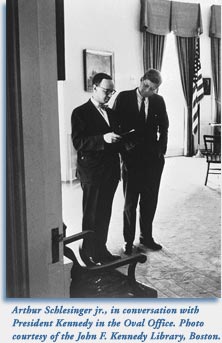Timelines
JFK and the AHA
Editor's Note: This essay launches a new series in which we aim to bring readers excerpts from, or features based on, the records and reports of the Association. We also welcome contributions reflecting the history of the AHA.
 Like most professional societies, the American Historical Association also enjoys the cachet associated with prominent members. The Association has taken pride in the fact that two "scholar-presidents," Theodore Roosevelt and Woodrow Wilson, served as AHA presidents. When John F. Kennedy assumed office in 1961, the Association expected he would follow his predecessors' example by affiliating with the AHA. The Association, however, found that getting a president to join was not as simple as in the days of Roosevelt and Wilson.
Like most professional societies, the American Historical Association also enjoys the cachet associated with prominent members. The Association has taken pride in the fact that two "scholar-presidents," Theodore Roosevelt and Woodrow Wilson, served as AHA presidents. When John F. Kennedy assumed office in 1961, the Association expected he would follow his predecessors' example by affiliating with the AHA. The Association, however, found that getting a president to join was not as simple as in the days of Roosevelt and Wilson.
Following Kennedy's inauguration in January 1961, Samuel Flagg Bemis, president of the AHA, wrote Kennedy inviting him to join in recognition of his historical works While England Slept and Profiles in Courage. After three months without a response, the AHA decided to approach the president through his special advisor, historian Arthur M. Schlesinger jr. Boyd Shafer, executive secretary of the AHA, wrote Schlesinger on May 3, 1961, reminding him of Bemis's invitation to Kennedy and noting the lack of a reply. Shafer cited the examples of Roosevelt and Wilson and urged Schlesinger to work for acceptance.1
Schlesinger pursued the matter through appropriate channels by sending a memo to Kennedy aide and speechwriter Fred Holborn, strongly recommending that the president accept membership. The invitation worked its way slowly through the bureaucracy and in October 1961, Kennedy finally agreed to join. Bemis presented his nomination and the AHA Council unanimously approved.2
Having gained the U.S. president as a member, the AHA sought to publicize his affiliation. Shafer contacted Schlesinger and suggested that Kennedy attend the upcoming AHA annual meeting in Washington in December. Shafer recommended that Kennedy attend Bemis's presidential address "in which he [Bemis] sums up American diplomatic history as he, in his characteristic way, stands for freedom and firmness, fortitude and courage."3 Schlesinger passed the invitation on to Kennedy aide Kenneth O'Donnell, adding a suggestion that the president also host a White House reception for AHA officials, "the leading historians of the nation." O'Donnell replied that although the president appreciated the invitation, he would "be basking in a warmer climate" than Washington in December.4
Kennedy did send a telegram conveying his regrets that was published in the American Historical Review with an introduction noting, "At every meeting of the Association it is sadly observed that some members fail to appear. The following telegram expresses the concerns of a well-known member who was unable to attend." In his note, Kennedy mentioned that he had read Bemis's address and the Association deserved special commendation for "enabling a Republican from Yale to make good on the new frontier."5
Although the president did not visit the convention or host a White House reception, the AHA was happy to have him as a member. It discovered, however, a minor problem: the president had not paid his dues. Shafer first mentioned "this one small embarrassing item" to Schlesinger in October. He noted that as the AHA had no honorary members, the president would have to pay the $10.00 annual fee. After Schlesinger tactfully raised the dues issue, O'Donnell eventually sent a check.6
As all members of the AHA have found, the dues question does not end with the initial payment. In January 1963 Shafer again contacted Schlesinger about the AHA's "embarrassment" that Kennedy was three months late with his renewal. His membership had lapsed in September 1962, and there had been no response to repeated overdue notices. The issue was of special concern, as Kennedy had agreed to review four volumes of The Adams Papers for the American Historical Review.7
Schlesinger immediately sent a note to Mrs. Evelyn Lincoln, Kennedy's personal secretary, suggesting that the president become a life member to avoid the annual renewal notices. Schlesinger's argument succeeded, as a month later he sent a note to Shafer that he was "happy to provide the Association with a new life member" and enclosed his own check for $200 in Kennedy's name.8
Current AHA members can perhaps draw inspiration from the vigorous pursuit of new members exhibited by the Executive Council in 1961. When faced with the annual renewal notice, they can also gain comfort from the knowledge that no one, not even the president of the United States, can escape payment.
—Tom Noer teaches history at Carthage College.
Notes
1. Boyd Shafer to Arthur M. Schlesinger jr., May 3, 1961, Arthur M. Schlesinger jr. Papers, box 3, John F. Kennedy Library, Boston, Mass.
2. Schlesinger to Fred Holborn, May 16, 1961; Shafer to Schlesinger, October 6, 1961, loc. cit.
3. Shafer to Schlesinger, October 6, 1961, loc. cit.
4. Schlesinger to Kenneth O'Donnell, October 27, 1961; O'Donnell to Schlesinger, November 6, 1961, loc. cit.
5. American Historical Review, 67 (April 1962), 854.
6. Shafer to Schlesinger, October 6, 1961; O'Donnell to Schlesinger, November 6, 1961, Schlesinger Papers, box 3.
7. Shafer to Schlesinger, January 14, 1963, loc. cit. Kennedy's review is in the American Historical Review, 68 (January 1963), 478–80.
8. Schlesinger to Mrs. Evelyn Lincoln, January 16, 1963; Schlesinger to Shafer, February 7, 1963, loc. cit.
Tags: Member News
Comment
Please read our commenting and letters policy before submitting.






